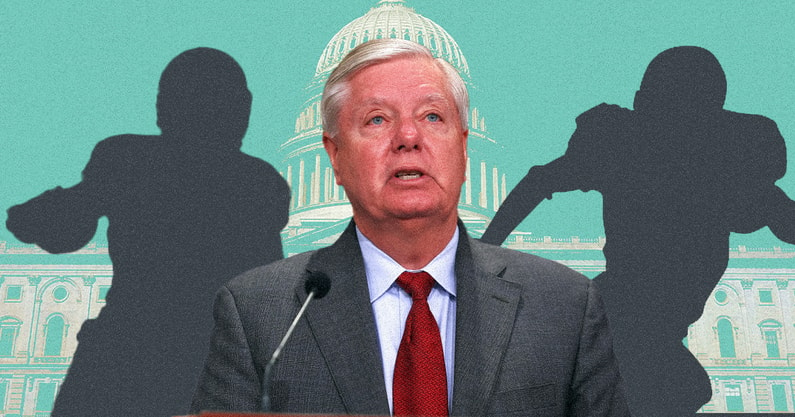Sen. Lindsey Graham's NIL drafted legislation would establish clearinghouse

A draft of Congressional legislation is being circulated throughout collegiate stakeholder groups that would establish an NIL clearinghouse, which would have the power to fine anyone, sue anyone and ban anyone from participating in college athletics.
Drafted by the office of Sen. Lindsey Graham, Republican of South Carolina, the legislation has been titled the “College Sports NIL Clearinghouse Act of 2023.” A source provided On3 with the draft, which would basically establish another version of the NCAA to preside over name, image and likeness activity.
NCAA lobbyists have long pushed for a piece of federal legislation that would give oversight power in college athletics’ new market of endorsements and collectives. The clearinghouse would also be given an antitrust exemption, another major item on the NCAA’s wishlist.
As the drafted bill states, “The NIL Clearinghouse shall carry out enforcement actions for any violation of this Act, including by levying fines, imposing penalties, including suspension or a permanent ban of an individual or entity from participation in varsity intercollegiate sports competition for a period determined by the NIL Clearinghouse and commencing civil actions and seeking all appropriate legal, equitable, or other relief, including damages and injunctions.”
The purpose behind the NIL clearinghouse would be to monitor compliance, establish and enforce penalties and provide educational information to athletes. The legislation provides some protections to athletes, including prohibiting institutions from limiting playing time or making changes to scholarships as retaliation for an NIL deal. Yet, universities would have the power to prohibit their athletes from entering into agreements that would violate state law or the student conduct code.
Institutions would also have the right to, “provide each enrolled student-athlete a list of entities” athletes would be prohibited from entering business relationships with. The clearinghouse would provide any information to the Federal Trade Commission, the Department of Justice or the attorney general of any state.
The College Sports NIL Clearinghouse Act would also give immense power to institutions and conferences while taking a major shot at taking down NIL collectives, which have surfaced at nearly every Power 5 school over the last 22 months. The race in college athletics has morphed into stockpiling the most cash to distribute to current players so recruits know what they can make once they enroll at the college.
According to the bill, there would be nothing limiting the ability of an “institution, conference or athletic association to prohibit a third party from providing a student-athlete” with a recruiting inducement or compensation for participating in a sport.
Civil suits the NIL clearinghouse would like to bring against athletes or third parties could be prosecuted by the attorney general. The drafted bill states the attorney general can, “bring a civil action for a violation of this Act in any appropriate district court of the United States.”
NCAA pressure on Congress does not guarantee movement
One would have to assume Graham consulted with his state’s Power 5 institutions, South Carolina and Clemson, when constructing the bill. The last time NIL was a topic on Capitol Hill was back in March, when lawmakers asked a string of questions that often missed the mark in a hearing.
Top 10
- 1Breaking
Rivals x On3
On3 acquires Rivals
- 2Hot
Paul Finebaum
Josh Heupel job security
- 3Trending
Bill Belichick
CBS News fires back at UNC coach
- 4
Jordan Travis
Retires from football
- 5
Ian Schieffelin
Joining Clemson football team
Get the On3 Top 10 to your inbox every morning
By clicking "Subscribe to Newsletter", I agree to On3's Privacy Notice, Terms, and use of my personal information described therein.
New NCAA president Charlie Baker, who took over for Mark Emmert in March, has made repeated trips to Washington, D.C., since taking the job. The NCAA has been looking for a bill that would create an NIL standard and preempt state NIL laws. States across the country, including Arkansas, Colorado, Missouri, Montana, New York, Oklahoma and Texas, have recently passed or are considering reform squarely aimed at bypassing NCAA NIL oversight. The NCAA also wants legislation that clearly states athletes are students, not employees. That is missing from Graham’s drafted bill.
What the Senator’s legislation would provide is protections from legal challenges so the clearinghouse could create more rules around NIL.
Conference commissioners called for reform, driven by legislation, throughout last summer. That has not changed, with ACC commissioner Jim Phillips the latest to call for a standardized NIL contract earlier this week at the league’s spring meetings.
Democrats and Republicans continue to remain far apart on much of the language being introduced in these bills. One of the main arguments between the two parties has been over classifying athletes as employees.
The clock is starting to tick, however, on seeing meaningful legislation passed by Congress. The 2024 election cycle is starting to pick up and party lines will surely be drawn for good by this fall or winter.
There does not appear to be a backup plan, except for NIL to possibly blow up in the face of the NCAA.
“Plan B, in my view, is that there will be a scandal,” Tom McMillen, a former Congressman who is the CEO of LEAD1 Association, recently told On3. “And it will compel Congress to act. It just always works that way. We don’t want that to happen. We would rather do this preemptively. But plan B is there’s going to be a crisis. You have a situation where you really have unaccountable [NIL] collectives, and student-athletes without a transparent market.”